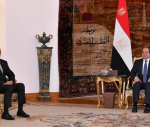You are here
Syria war crimes must not be forgotten
Aug 16,2016 - Last updated at Aug 16,2016
Even if at one point in time a political solution is achieved, ending years of bloody conflict in Syria, the international community should not compromise on a pledge to investigate war crimes and crimes against humanity committed by various parties against civilians and combatants.
Only last week, international organisations accused the Syrian regime of dropping barrels of chlorine gas on rebel-held suburbs of Aleppo. At least four civilians were killed and many suffered respiratory complications.
This comes as the US and Russia claim to have dismantled the regime’s arsenal of chemical weapons.
The fact that such weapons were used repeatedly in the past years underlines the lack of a political will to pursue and punish perpetrators and bring them to justice.
The list of atrocities is long and horrifying.
According to physicians for Human Rights, at least 738 Syrian doctors, nurses and medical personnel died in more than 360 attacks on medical facilities in Syria since March 2011.
More than 90 per cent of these attacks have been blamed on the Syrian government and Russia.
The last week of July was described as the worst for Syrian hospitals since the beginning of the crisis. Six hospitals in and around Aleppo were bombed between July 23 and 31 in what appeared to be deliberate targeting of civilian institutions.
Rebel-held areas are systematically and indiscriminately struck by regime helicopters using barrel bombs causing civilian deaths and destroying houses, mosques, schools, markets and hospitals.
The Syrian army and its allies have besieged towns and districts within cities for months and even years, and only rarely allowed humanitarian convoys to pass through.
The UN has repeatedly warned against worsening humanitarian conditions in towns under siege. The number of civilians dying of hunger and lack of medicine is believed to be in the thousands.
Those who are under government control are not doing any better. Suspected sympathisers and opposition members are held in inhumane conditions in secret and public prisons.
The Commission for International Justice and Accountability is building cases against Syrian officials for possible future prosecution. It claims to have compiled evidence that implicates high-level regime officials in violations of international law, and connects President Bashar Assad and his administration to the systematic murder and abuse of Syrian citizens.
The UK-based Syrian Observatory for Human Rights revealed last May that more than 60,000 people were killed through torture or died in dire humanitarian conditions in Syrian government prisons during the country’s five-year uprising.
Human Rights Watch concluded that photographic evidence smuggled out of Syria had documented the death of more than 28,000 prisoners in government custody.
But torture and murder are not exclusive to the regime. In a February 2016 report, the UN Human Rights Council accused both government and opposition forces, including Al Nusra Front and Daesh, of subjecting detainees to torture.
It accused them of committing war crimes and crimes against humanity.
Daesh is especially cruel in its treatment of civilians under its rule and in carrying out atrocities against religious and ethnic minorities.
In addition, the UN commission investigating human rights abuses in Syria confirmed at least nine intentional mass killings in the period 2012 to mid-July 2013, identifying the perpetrators as the Syrian government and its supporters in eight cases, and the opposition in one.
That figure has risen since then, with more mass graves being discovered and reported by the media. But international organisations do not have access to most of these locations and there is always lack of proper documentation.
Russia, which has intervened militarily in Syria last September, has not escaped blame for possible war crimes.
Last February, Amnesty International (Al) claimed that Moscow’s air force has not only been targeting civilians and aid workers in Syria, but that warplanes have been deliberately attacking those attempting to treat the victims, describing such attacks as war crimes.
Even pro-West moderate opposition groups have been accused by AI of potential war crimes, including those fighting under the banner of the Free Syrian Army.
AI said the most well-known are instances in which they have carried out mass summary killings of captured government soldiers.
Jaish Al Islam and Nur Eddine Zinki groups have also been accused to committing atrocities against civilians.
More than 300,000 people were killed in Syria, according to various sources. There is no doubt that war crimes and crimes against humanity have been committed during the past five years.
Atrocities continue and without serious intervention by the international community, the regime, its allies and the opposition will not change their methods.
There has to be an international commitment to open an investigation and appoint a prosecutor. Failure to do so will discredit the international justice system and assure mass killers that they can escape judgement.
The writer is a journalist and political commentator based in Amman.













